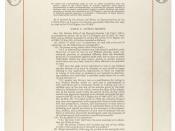Title VII of the Civil Rights Act plays an essential role in defining the employment practices found in today's work environment. The law passed in 1964 also known as Title VII, prohibits employment discrimination and since its initiation, Title VII has sparked an increase in anti-discrimination laws designed to promote equal opportunity in the workplace.
Title VII, the section that deals with discrimination in the workforce is one small part of the larger picture. The Civil Rights Act originally came forth to help African AmericanÃÂs fight against discrimination and as time past, Title VII had a tremendous impact in the workplace because it outlawed discrimination against race, color, sex, religion, age, or national origin, and this helped to protect all individual rights for all races and nationalities.
Prior to 1964, the civil right advocates had dealt with failure after failure to past legislation to prohibit discrimination. In March of 1941 a bill, entitled ÃÂA Bill to Prohibit Discrimination by Any Agency Supported in Whole or in Part with Funds Appropriated by the Congress of the United States, and to Prohibit Discrimination against Persons Employed or Seeking Employment on Government Contracts because of Race, Color or CreedÃÂ went to Congress and then to a House Committee.
A little over a year later, another bill, entitled "A Bill to Prohibit Discrimination in Employment because of Race, Color, Creed, Religion, National Origin, or CitizenshipÃÂ was also passed through Congress in then to a House Committee. Both of these bills died in the committee (Vaas, 1966).
Proposal of hundreds of similar type bills all them died in either the House or Senate. Sometimes in committees and sometimes if they had reached the floor they died in a filibuster. It appeared the country was not ready for a change, or at least the men controlling...


